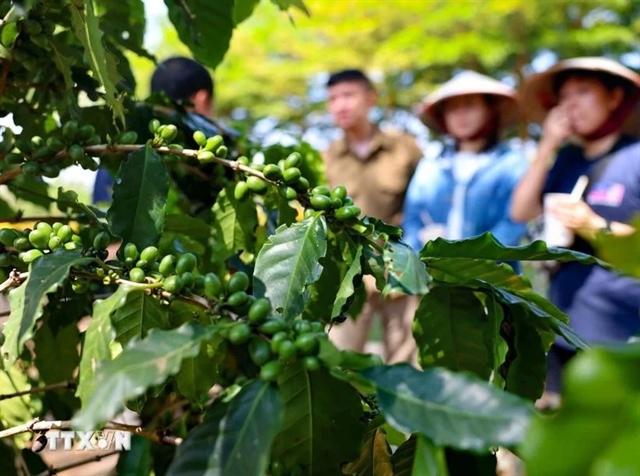 Economy
Economy


|
| Coffee grown in the Central Highland province of Đắk Lắk. — VNA/VNS Photo |
HÀ NỘI — The Ministry of Agriculture and Environment has set a target for the agro-forestry-fishery sector to grow by at least 4 per cent in 2025, with export turnover expected to reach US$65-70 billion.
To achieve the goals outlined in the recently issued action plan, the ministry has rolled out eight key tasks and solutions, focusing on accelerating administrative reform; advancing sectoral restructuring; promoting digital transformation and innovation; expanding domestic and international markets; strengthening industries and fields that support agricultural, forestry, and fishery production; enhancing communication and raising public awareness of agricultural development and environmental protection.
Accordingly, attention will be paid to enhancing regulatory frameworks and policies to support sector growth and exports; and effectively implementing resolutions, development strategies, programmes, and plans in a coordinated manner.
Accordingly, the ministry will comprehensively review and revise sector-specific legal documents; and work with other ministries, the State Bank of Việt Nam, and relevant agencies to improve mechanisms for supporting projects and green credit, aiming to boost investment in environmentally friendly economic sectors.
It will focus on restructuring sub-sectors and specific areas within each industry substantively and effectively. This effort will be closely linked to a shift in the growth model by promoting the application of science and technology, digital transformation, and innovation, towards improving productivity, quality, efficiency, competitiveness, self-reliance, adaptability, and resilience of the agricultural economy.
The sector will promote marine aquaculture and sustainable seafood exploitation, with a strong focus on fully addressing the European Commission's recommendations to have “yellow card” removed for Vietnamese seafood within this year.
The ministry will simplify regulations and administrative procedures related to investment, production, business activities within its management scope, particularly in environmental protection, specialised inspection, land use, and mineral resources.
Efforts will be made to drive breakthroughs in scientific research, technology application, and innovation. Focus areas include agricultural industrialisation, advanced processing, post-harvest preservation, smart and automated production, the development of aquatic breeds, and deep processing to reduce costs and post-harvest losses.
Additionally, enhancing competitiveness by tapping into potential export markets while boosting domestic consumption through modern distribution systems. Especially, the ministry is developing a set of criteria for market classification and setting export targets by sub-sector and market – particularly focusing on high-potential markets. It is also preparing export market reports for agricultural products, along with response strategies to address changes related to tariffs, origin requirements, and technical standards in key markets such as the US, the EU and China.
Communication strategies will be revamped to promote agricultural development policies, introduce successful production models, and counter misinformation that can negatively impact consumers and businesses. — VNS